1. Jimmies (Philadelphia/New England)
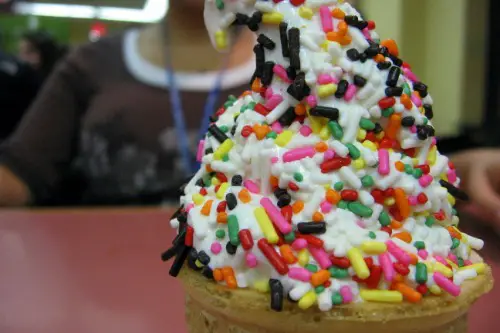
In much of the U.S., those tiny colorful ice cream toppings are called “sprinkles.” But in Philadelphia and parts of New England, they’re called “jimmies”, according to Abby Patkin from Boston.com. There’s some debate about where the term came from, but it dates back to the early 20th century. Some believe it originated with the Just Born candy company in Pennsylvania.
Elsewhere, asking for jimmies might get you a blank stare. Or worse, someone might think you’re talking about something entirely unrelated. It’s one of those hyperlocal quirks that’s fading a bit, but still strong in certain areas. Just don’t mix up your jimmies and your sprinkles if you want to blend in.
2. Hella (Northern California)
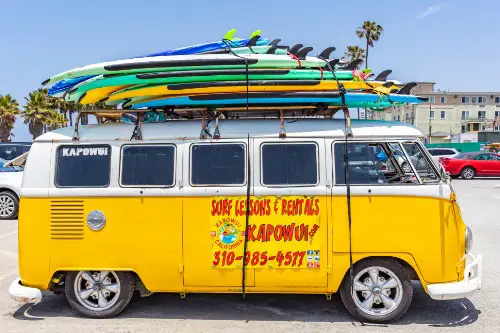
If you’ve ever been around someone from the Bay Area, you’ve probably heard them say “hella” to mean “very” — as in, “That’s hella cool.” It’s a regional intensifier that’s been part of Northern California slang since at least the 1980s, according to Ryan Fonseca from The Los Angeles Times. What’s wild is that people from other parts of the U.S. often don’t realize it’s regional until they get weird looks outside of California. It’s one of those words that really sticks once you start using it.
The popularity of “hella” even led to its inclusion in dictionaries, and it’s occasionally used in pop culture. But try dropping it in the South or on the East Coast and you might get a confused pause. It’s so ingrained in NorCal that some folks assume it’s nationwide. Spoiler: it’s definitely not.
3. Yinz (Pittsburgh)

“Yinz” is the Pittsburgh version of “y’all” — a second-person plural that uniquely identifies someone from Western Pennsylvania. It’s short for “you ones,” which evolved into “yinz” through the region’s Scotch-Irish linguistic roots. Many lifelong Pittsburghers use it without blinking, especially in phrases like “Are yinz going downtown later?” It’s such a regional marker that locals are affectionately called “Yinzers.”
Outside of Pennsylvania, though, this word can sound almost made up. People often think it’s a joke until they hear it used completely seriously. And unlike “y’all,” it hasn’t traveled far beyond its hometown. It remains deeply tied to the identity of the Steel City.
4. Wicked (New England)

In most places, “wicked” means evil — something bad or scary. But in Boston and throughout New England, it’s a positive intensifier, like “wicked smart” or “wicked good,” according to Melia Robinson from Business Insider. This usage dates back to the early 20th century and has hung on strongly in the region. It’s so common there that many locals forget it’s not standard elsewhere.
Elsewhere in the U.S., people might think you’re trying to be ironic or theatrical. But Bostonians use it without any irony at all — it’s just how they talk. It’s one of the clearest giveaways of a New Englander outside their territory. Just don’t try to use it unless you’ve got the accent to match.
5. Fixin’ To (Southern U.S.)

In the American South, if someone says they’re “fixin’ to” do something, they mean they’re about to — like, “I’m fixin’ to head to the store.” It’s a casual way of indicating intent that often puzzles people from other regions, Terryn Hall from The Kitchn explains. The phrase likely stems from older British English uses of “fix” meaning to prepare. It’s still widely used in Southern states like Texas, Georgia, and Alabama.
Outside the South, “fixing to” might be interpreted literally, like you’re repairing something. But Southerners use it fluidly, often without realizing it might sound foreign to others. The phrase captures a relaxed sense of timing — something’s coming, but not urgently. It’s charming, but confusing if you’re not in the know.
6. Jeet? (Chicago/Philly)

“Jeet?” is a compressed version of “Did you eat?” often heard in cities like Chicago or Philadelphia. Locals rattle it off so fast it sounds like one syllable. It’s an example of elision — when sounds are dropped in rapid, casual speech. You’ll usually hear it during lunchtime greetings: “Jeet yet?”
If you’re not from these cities, you might have no clue what was just said. It’s not that the words are unfamiliar — just the way they’re mushed together. It shows how speech patterns can become uniquely regional over time. And it’s one of those things people don’t even realize they’re saying differently.
7. Pop (Midwest)

If you’re from the Midwest and ask for a “pop,” you’re just looking for a carbonated drink. But head to the coasts, and people might think you’re talking about your dad or a loud noise. The word “pop” is most commonly used in places like Michigan, Ohio, and Minnesota. It’s been part of Midwestern vocabulary for generations.
People in the South usually say “Coke” for any kind of soda, while the coasts tend to stick with “soda.” This can cause confusion — someone might hand you a Coca-Cola when you just wanted a Sprite. “Pop” is one of those small words that really highlights where someone grew up. And yes, Midwesterners are usually very loyal to it.
8. Buggy (Southern U.S.)
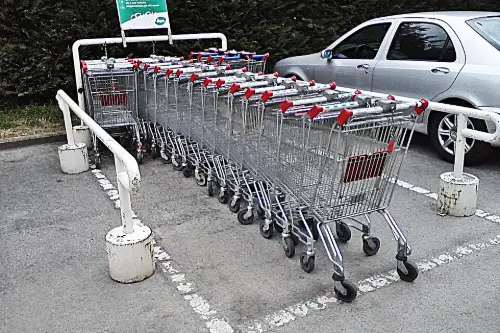
To most Americans, a “buggy” is either a baby stroller or something from the Old West. But in the South — especially in states like Kentucky, Mississippi, and Alabama — it means a shopping cart. You’ll hear things like, “Go grab a buggy from the front.” It throws a lot of visitors off because the term sounds so old-fashioned.
Yet locals use it totally unironically, and stores in the South even put up signs using the word. This kind of usage has historical roots, tracing back to older British English. But it’s held on far longer in the American South. And it’s definitely one of those regional quirks you’ll only hear at your local Piggly Wiggly.
9. Grinder (New England)
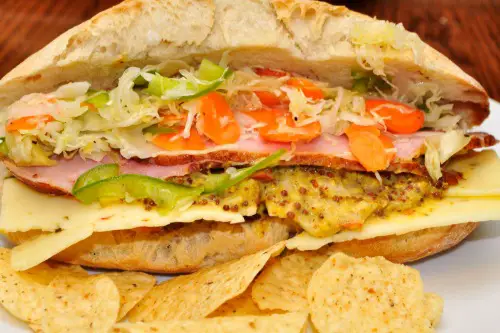
In most of the country, it’s called a sub, hoagie, or sandwich. But in parts of New England — especially Connecticut and Rhode Island — it’s a “grinder.” The term originally referred to the chewing involved in eating crusty Italian bread. Over time, it came to refer to the sandwich itself.
Outside of New England, “grinder” might make people think of the app or power tools. But in sandwich shops across the region, it’s still a common term. Locals might not even realize it’s regional because it’s so embedded in daily life. Just don’t expect to find “grinders” on the menu elsewhere.
10. Cattywampus (Southern U.S.)
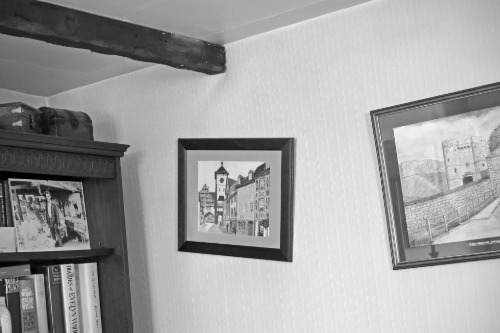
“Cattywampus” means something is crooked, askew, or out of sorts — like if a picture frame is tilted or a plan has gone awry. It’s most commonly heard in the South, and it sounds like something straight out of a Mark Twain novel. The word has Scottish origins, with similar-sounding cousins like “wampus” and “skew-whiff.” It’s one of those whimsical terms that Southerners use without a second thought.
To outsiders, it can sound like total nonsense or a made-up word. But for many Southerners, it’s just colorful vocabulary. It’s particularly useful when describing anything messy or disorganized. And while you might not hear it much outside the South, it’s still going strong there.
11. Lagniappe (Louisiana)
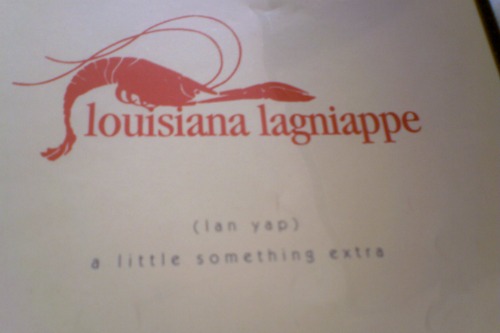
In Louisiana — especially around New Orleans — “lagniappe” means a little extra, like a bonus or a free gift. You might get a lagniappe at a restaurant when the chef sends out an extra dish, or at a shop that tosses in a freebie. The word comes from Louisiana Creole and Spanish, originally meaning “a little something extra.” It reflects the region’s blend of cultures and hospitality.
Most Americans have never heard the term, and might not even know how to pronounce it (it’s lan-yap). But in Cajun and Creole communities, it’s widely understood and used. It captures a generous, laid-back attitude that’s very Louisiana. And it’s a beautiful example of how language reflects local culture.
12. Carry-In (Midwest)
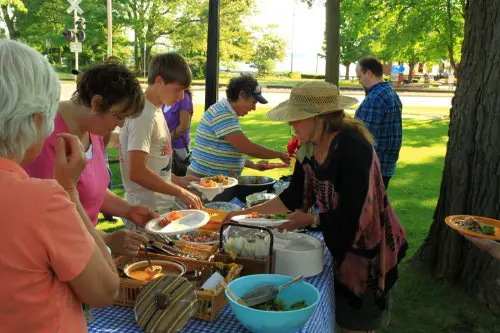
Elsewhere in the U.S., it’s called a “potluck.” But in the Midwest — especially Indiana and Ohio — it’s often called a “carry-in.” The idea is the same: everyone brings a dish to share. But the name “carry-in” refers specifically to the action of bringing food to an event.
People unfamiliar with the term might not understand what kind of event it is. It sounds like it could be about takeout or even church services. But Midwesterners know it means home-cooked casseroles, crockpots, and probably some kind of Jell-O salad. It’s a subtle but telling linguistic difference.
13. Slippy (Pittsburgh)

In Pittsburgh, if a sidewalk is icy, it’s “slippy.” Not slippery — just slippy. It’s one of those unique localisms that seem like typos to everyone else but feel totally normal to Pittsburghers. It’s often used in everyday speech without a second thought.
The term likely stems from old Scots-Irish dialects that shaped Pittsburgh English. But if you use it outside of Western Pennsylvania, you’ll probably get corrected. “Slippy” has such strong regional roots that it even shows up in Pittsburgh-themed merchandise. It’s a tiny word that gives away a whole city.
14. Catawampus (Appalachia/Southern U.S.)
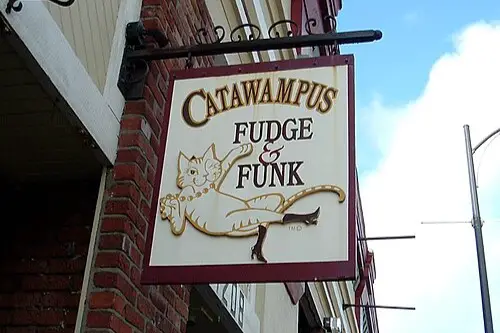
Yes, this is different from “cattywampus” — though the meanings overlap. “Catawampus” can mean crooked, chaotic, or diagonally positioned. It’s used across parts of Appalachia and the Southern U.S., and it dates back to the 19th century. The word probably comes from fanciful American English blending and has no clear etymological root.
People often confuse it with “cattywampus” or assume it’s a joke. But in regions where it’s used, it has a solid place in everyday language. It’s one of those quirky, expressive words that makes regional English so rich. And yes — both versions still pop up in casual Southern speech.


